9 Best Post-Workout Habits for Muscle Recovery
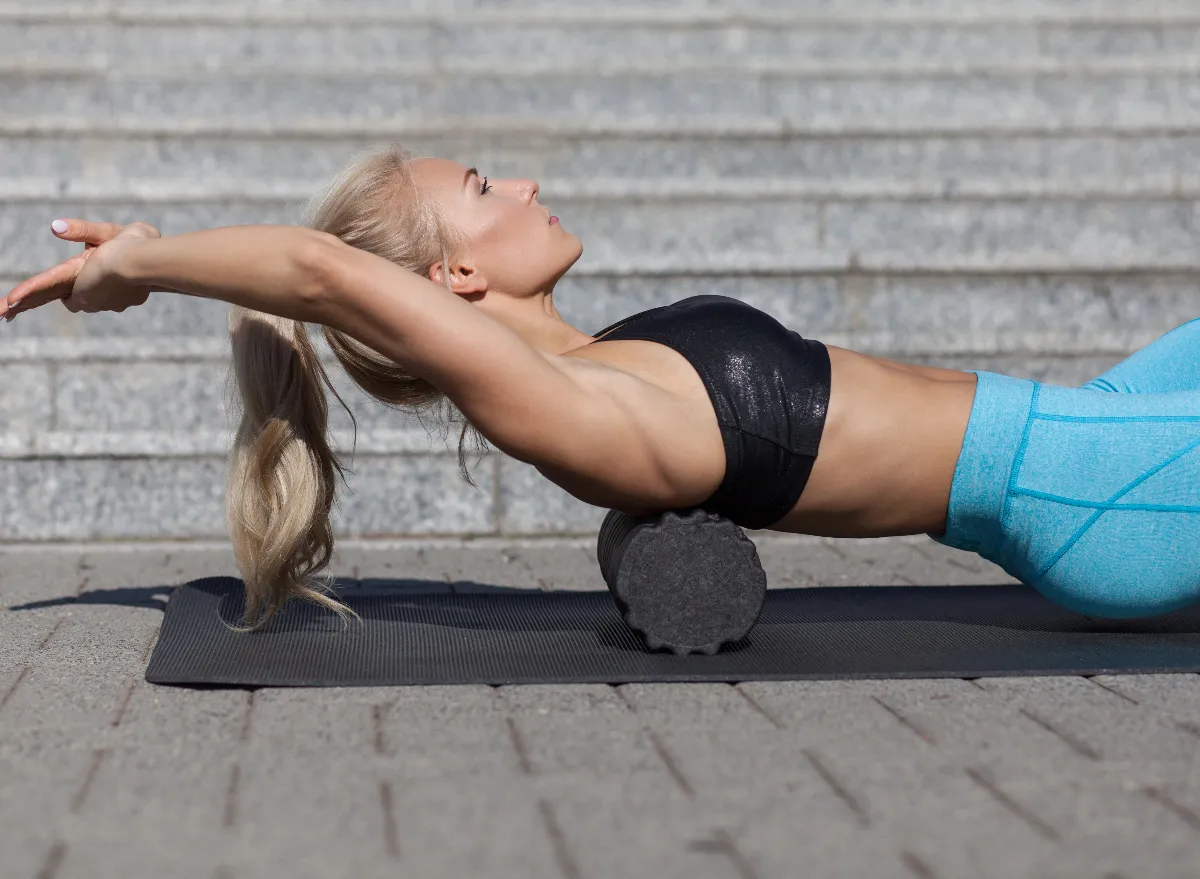
So you’ve just crushed a challenging workout—exhausted, sweat-soaked, and that accomplished feeling of progress washing over you. But the job’s not done yet. What you do after your workout is just as critical as the effort you put in during those grueling sets and reps. It’s the crucial recovery period when your body works on repairing and growing your hard-earned muscle. To find out the best post-workout habits for muscle recovery, we chatted with TJ Mentus, CPT, a certified personal trainer at Garage Gym Reviews, who serves up his nine best recovery tips to help you optimize your gains in the gym.
These tried-and-true strategies can help you maximize the benefits of your training, minimize injury risk, and ensure you’re back in the gym, or wherever you work out, at your best. Whether you’re a seasoned weightlifter, a dedicated yogi, or a cardio enthusiast, your body craves and needs proper recovery. Research shows that during this time, your muscles repair and adapt, allowing them to recover for future progress.
Keep reading for the best post-workout habits for muscle recovery. This way, you will make the most of every drop of sweat you shed in the gym and avoid the pitfalls of overtraining or burnout. And, when you’re finished, don’t miss these 9 Best Strength Exercises for Better Bone Health.
Cool down.

Following a strenuous workout, winding down is crucial. According to a 2022 study published in Sports Medicine-Open, cooling down kickstarts the recovery phase and can prevent “fatigue resistance” following exercise. A short walk or gentle stretching can gradually lower your heart rate and prevent muscle soreness.
“After a hard workout, it’s important to gradually bring your heart rate and nervous system back down to pre-exercise levels,” says Mentus. “This helps initiate the recovery process. Do five to 10 minutes of low-intensity movement, such as walking or stretching after a workout, to bring your body back to homeostasis.”
Get your protein.
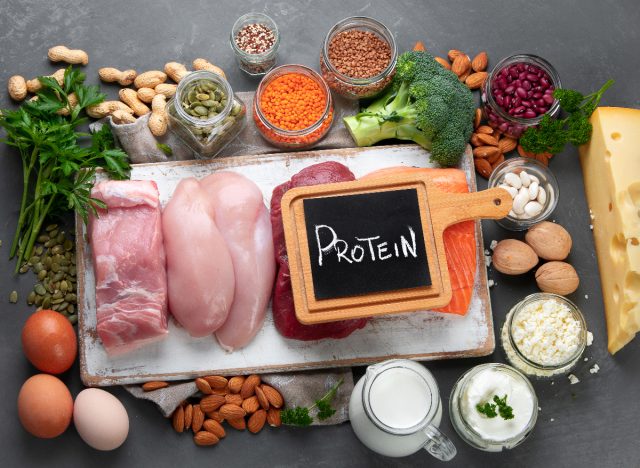
It’s no secret that your muscles need protein to grow. And there’s plenty of research that backs this up. A protein shake, a serving of Greek yogurt, or some lean chicken can kickstart muscle repair and growth.
As for the amount of protein, Mentus says, “Aim to get 25 to 30 grams of protein after your workout to help build up the muscle tissue broken down while working out. Ideally, you should consume protein within two hours after your workout. In addition, make sure at least 30 percent of the calories you consume daily are from protein to help promote muscle growth.”
Consume carbs.
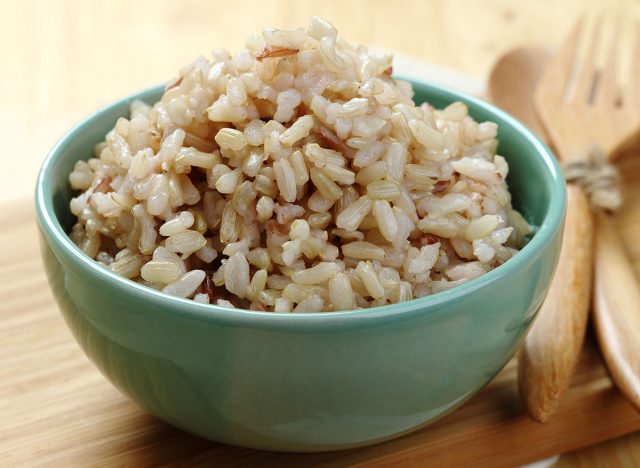
Don’t shy away from carbs after your workout. Complex carbs like sweet potatoes or brown rice refuel your energy stores, so you’re ready for your next training session. Carbs break down into glucose, which plays a role in muscle protein synthesis.
“Carbs fuel the body and give energy to the muscles for workouts,” explains Mentus. “Without proper fuel for a workout, your performance and results will suffer. Have a high-carb snack of 40 to 50 grams before a workout to help fuel your muscles. Eat a post-workout meal that includes 20 to 30 percent of your daily carb intake.”
Related: This $23 Workout Top Has Over 25,000 5-Star Reviews on Amazon
Do foam rolling.
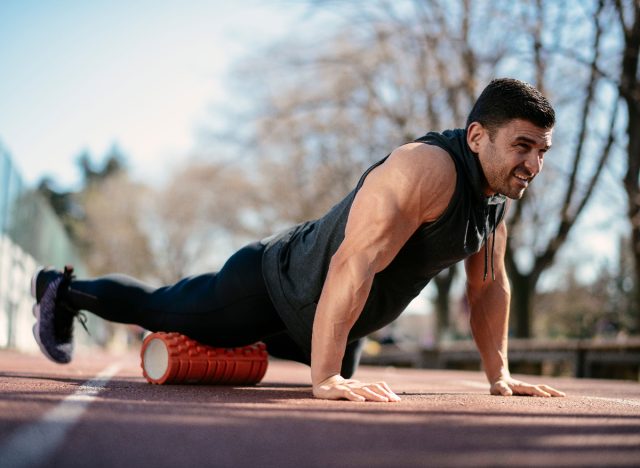
Foam rolling is like giving your muscles a mini-massage. A 2015 study published in the Journal of Athletic Training found foam rolling can reduce muscle fatigue and soreness while boosting muscular performance. Foam rolling also helps release tension and knots, improving flexibility and reducing post-exercise discomfort.
“Foam rolling and soft tissue work helps to relieve tightness and muscle soreness. It helps reduce inflammation and promote blood circulation, bringing nutrients to the muscles so they can recover,” says Mentus.
Prioritize sleep.

According to one scientific review, sleep deprivation impairs muscle recovery and can weaken your immune system. “Sleep is the most important thing for recovery,” states Mentus. “This is when your body can relax and repair itself from the day. Without proper sleep, your body breaks down at a rate faster than it can repair. Lack of sleep can increase stress levels and negatively affect hormones, energy, and cognitive function. Aim to get at least eight hours of sleep and get to bed no later than 10 PM.”
Hydrate.

Proper hydration is essential for how you perform during workouts, along with muscle recovery. “Our bodies are mostly water, which is why hydration is important,” says Mentus. “Besides water, we need proper electrolytes to be fully hydrated. Important electrolytes are sodium, potassium, magnesium, calcium, chloride, and phosphate. This is why you may experience cramps, brain fog, or lightheadedness when you’re dehydrated.”
Stretch.

Research shows that just a few minutes spent stretching post-workout can ease muscle soreness. “Stretching helps prevent muscles from stiffening up post-workout. It’s also a good low-intensity movement that promotes blood flow into the muscles to deliver nutrients,” explains Mentus.
Take an ice bath.

It might sound extreme, but research shows that ice baths can reduce muscle soreness and inflammation. It’s not for the faint of heart, but some swear by its benefits. “Ice baths are great for reducing inflammation and soreness. Cool water to 53 degrees Fahrenheit, and stay immersed for five to ten minutes for maximum benefits,” says Mentus.
Enjoy a sauna session.
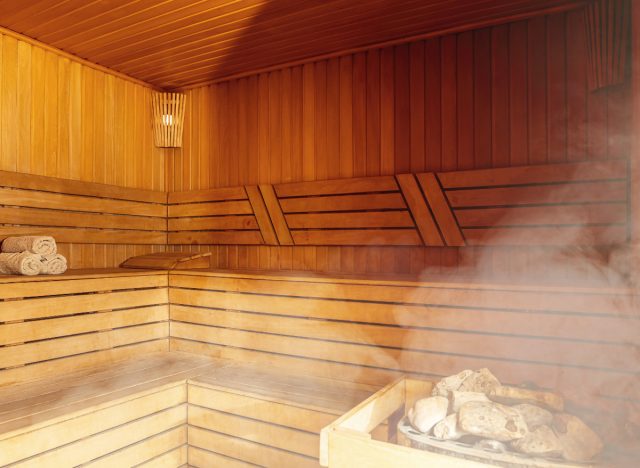
According to a recent study published in Biology of Sport, saunas can promote relaxation, increase blood flow, and boost muscle recovery. Plus, they feel good after a challenging workout. “The heat of a sauna helps to loosen muscles up and increase recovery,” says Mentus. “Using one before working out can help warm the body quicker and prevent post-workout soreness. Keep sauna sessions under 30 minutes to prevent them from causing too much stress on your body.”
- Source: https://www.ncbi.nlm.nih.gov/pmc/articles/PMC8072992/
- Source: https://www.ncbi.nlm.nih.gov/pmc/articles/PMC8901468/
- Source: https://www.ncbi.nlm.nih.gov/pmc/articles/PMC5852756/
- Source: https://www.ncbi.nlm.nih.gov/pmc/articles/PMC7803445/
- Source: https://www.ncbi.nlm.nih.gov/pmc/articles/PMC4299735/
- Source: https://www.ncbi.nlm.nih.gov/pmc/articles/PMC6988893/
- Source: https://pubmed.ncbi.nlm.nih.gov/21735398/
- Source: https://www.ncbi.nlm.nih.gov/pmc/articles/PMC5285720/
- Source: https://www.ncbi.nlm.nih.gov/pmc/articles/PMC10286597/









